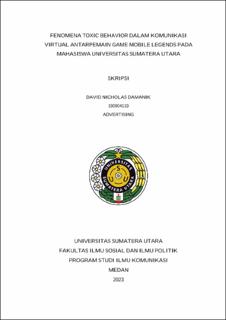| dc.description.abstract | This research is entitled "The Phenomenon of Toxic Behavior in Virtual Communication Between Mobile Legends Game Players in University of North Sumatra Students". The purpose of this study is to find out how Toxic Behavior occurs in Virtual Communication Between Mobile Legends Game Players in University of North Sumatra Students and find out the factors that cause the Phenomenon of Toxic Behavior in Virtual Communication Between Mobile Legends Game Players in University of North Sumatra Students). The theories and concepts in this study are Virtual Communication, CMC, Toxic Behavior, New Media, Online Games, and Mobile Legends. This research uses a qualitative approach with descriptive research methods. The data collection techniques used were interviews and direct observation. The number of informants in this study was five people by using purposive techniques. The informant is a student of the University of North Sumatra who plays Mobile Legends games, has a high intensity of playing with an average of five hours per day, a minimum epic rank, and has been penalized in the form of ban-chatting in the game. The factors that cause the phenomenon of toxic behavior in virtual communication are used based on three components of factors that make online games prone to become a place for the phenomenon of toxic behavior, namely, Competitive Elements, Anonymity, and Counterfactual Thinking. The results of this study showed that the five informants committed being toxic behavior because the game presented the excitement with a competitive system, so that game players such as the five informants were very ambitious to seek victory, then when they lost, the emotions that arose because the five informants did not accept defeat tended to blame the team they played with. They are certainly not afraid of the consequences, because they use anonymous identities that will not be detected by others including their victims, so they are more courageous to throw harsh sentences. And there was a change in communication patterns that were more aggressive after the informants got used to using harsh sentences, which affected the ethical values of each informant in their personal lives. | en_US |




